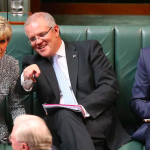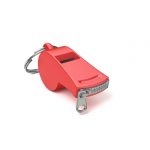The AFP Press Raids: Towards a Totalitarian State

As the federal government continues to pass one draconian national security law after another post-9/11, it’s often said that the concerning aspect of this is not that these laws will actually be used in the present, but there’s a chance they’ll be enforced if a more extreme power took office.
However, three weeks into its new term, the Morrison government has made clear that power is now here, as fresh national security laws that were passed last year with bipartisan support have been invoked during Australian federal police raids on two major media outlets.
Of course, that’s unless you buy the official version, which is the federal law enforcement arm acted of its own volition without the government’s knowledge.
On Tuesday, the AFP raided News Corp journalist Annika Smethurst’s home over an April 2018 report in which she exposed government intentions to spy on citizens, while on the following day, officers executed a warrant at the ABC’s Sydney office over a 2017 article on military misconduct.
The New York Times said the raids showed how far the “conservative government will go to scare officials and reporters into submission”. But, given their timing and basis in old news, it seems the raids were not only to warn journalists, but indeed, the entire nation that the rules have changed.
And so it begins
The AFP turned up at Annika Smethurst’s Canberra residence as she was getting ready to go to work on Tuesday morning. Officers spent eight hours rummaging through her place in relation to a report from over a year ago, which home affairs minister Peter Dutton dismissed as “nonsense” at the time.
Smethurst’s article concerned leaked documents that detailed Australian home affairs secretary Mike Pezzullo writing to secretary of defence Greg Moriarty regarding a proposal to give the Australian Signals Directorate the powers to spy on Australian citizens.
While the ABC offices on Harris Street in Ultimo were given some warning prior to the AFP executing a search warrant just after 11.30 am on Wednesday. After hours of searching through the broadcaster’s computers, officers left the building with two USB sticks containing electronic documents.
The raid was in relation to The Afghan Files report published in July 2017, which delved into leaked defence force files detailing alleged incidents of Australian troops killing unarmed men and children in Afghanistan, some of which were under investigation at the time.
First they came for
On Thursday, the AFP confirmed that the ABC and News Corp journalists could face prosecution over publishing the leaks. And while it remains uncertain as to which laws these reporters could be charged under, last year’s newly passed espionage laws are being touted as the most likely.
The National Security Legislation Amendment (Espionage and Foreign Interference) Bill 2018 was passed on 29 June last year. It updated secrecy laws and placed them in the Criminal Code Act 1995 (Cth). And it also revised espionage laws with dire implications for journalists.
Section 91.1 of the Criminal Code outlines that a person commits an offence if they deal with classified information that will prejudice Australia’s national security and communicates it, so it’s available for a foreign country.
The definition of national security under the act is broad and includes political and economic relations with other countries. And according to the attorney general’s office, it’s possible to communicate such information via “publication of news”.
For intentionally breaking this law a person can be sent away for life, while recklessly doing so – being aware that there was a substantial risk to it – can see an individual imprisoned for up to 25 years behind bars.
Access all areas
ABC News executive editor John Lyons live tweeted the raid on his office. He remarked in one tweet that he was “staggered by the power” of the warrant that allowed AFP officers to “add, copy, delete or alter” material on the broadcaster’s computers.
This hints to federal authorities utilising the new powers they were gifted via the Telecommunications and Other Legislation Amendment (Assistance and Access) Bill 2018, which passed through both houses on 6 December last year.
The legislation amended the search warrant framework contained in the Crimes Act 1914 (Cth), so as to provide law enforcement agencies with enhanced search abilities to collect evidence from electronic devices via a warrant.
So, for instance, section 3F of the Crimes Act now provides officers with the power to search a computer or data storage device and if necessary, “add, copy, delete or alter other data in the computer or device”.
And for some further food for thought, the Assistance and Access Bill provides security agencies with the powers to require communications providers to allow access to customers’ private data, as well as giving authorities the ability to install surveillance capabilities on a device.
Silencing whistleblowers
Former military lawyer David McBride leaked the documents that led to the ABC Afghan file report. He was arrested over the leaks last September and was charged with breaching the Defence Act multiples times, as well as the theft of Commonwealth property. He’s currently on bail.
The government is also undertaking the prosecution of former ASIS officer Witness K and their lawyer Bernard Collaery for disclosing that the Australian federal government bugged the offices of the Timor-Leste government in 2004 in order to give it the upper hand in oil negotiations.
And with the Morrison government currently carrying out its crackdown on journalists, it’s doubtful it will step up any assistance to Wikileaks publisher Julian Assange, who’s health is failing in UK detention, and now faces a maximum penalty of 175 years imprisonment if extradited to the US.
In these dark times
Prime minister Scott Morrison was in the UK at the time of the raids, while home affairs minister Peter Dutton was in Sri Lanka. Their claims that they were unaware the AFP were carrying out these significant operations one after the other seem somewhat dubious.
However, what’s clear is many Australians are questioning what three more years under the Coalition holds. And what hounds will next be unleashed: the right for religions to discriminate, national facial recognition surveillance, or deploying the troops to quell civil disobedience?







